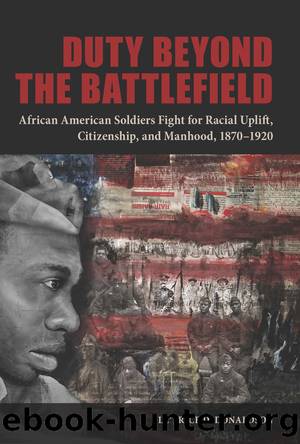Duty Beyond the Battlefield by Donaldson Le'Trice D.;

Author:Donaldson, Le'Trice D.; [Неизв.]
Language: eng
Format: epub
Publisher: Southern Illinois University Press
PART 2
4.
HENRY OSSIAN FLIPPER
The Lone Warrior
Social equality, as I comprehend it, must be the natural, and perhaps the gradual, outgrowth of a similarity of instincts and qualities in those between whom it exists.
âHenry O. Flipper
On the warm spring day of May 3, 1940, one of Americaâs most enigmatic historical figures died at his brotherâs home in Atlanta, Georgia. Henry Ossian Flipper in 1877 became the first African American graduate of the U.S. Military Academy at West Point. Flipper was also the first African American officer ever to be court-martialed and discharged from the U.S. Armed Forces. The strange and tumultuous military career of Henry Flipper has for many decades been a long-forgotten and hidden stain within American military history. Yet, from the time of Flipperâs court-martial in 1881 and discharge in 1882 until his death in 1940, he fought to restore his manly honor. What is unique about Flipperâs fight to clear his name, though, is that he had virtually no support from the African American community.
In this chapter, our journey shifts to another path, one that looks at the strange and solitary life of a man striving to be a member of the American bourgeoisie while being unable to escape his main handicapâhis blackness. We will explore why Flipper never fully developed a strong base of support among African Americans. How did this onetime hero to the black community and idol to James Weldon Johnson have the fight of his life without the support of those who helped him gain entrance to the U.S. Military Academy? In 1999, President Bill Clinton finally gave Flipper the full pardon and exoneration he had fought for since the day of his dishonorable discharge. The questions at the heart of this issue are these: Would it have taken as long if he had enjoyed the support of the African American community and major black leaders? And how did Flipper go from being an inspiration and a headline in every black newspaper to a simple footnote?
EARLY YEARS
Henry Ossian Flipper was born a slave on March 31, 1856, in Thomasville, Georgia, the eldest of five brothers. Methodist minister Reverend Reuben H. Lucky owned Flipper and his mother, Isabella Buckhalter. Festus Flipper, Henryâs father, was a shoemaker and carriage trimmer and was owned by a successful slave dealer named Ephraim G. Ponder. Flipper in his autobiography, The Colored Cadet at West Point, highlights the fact that both of his parents were of mixed racial heritage.1
In 1859, Ponder retired and wanted to relocate from Thomasville to Atlanta. Festus Flipper did not want to be separated from his wife and child, who would remain in Thomasville with Reverend Lucky. Ponder allowed Festus to hire himself out and earn his own money, enabling him to loan Ponder enough money to purchase his wife and son from Lucky. When Ponder arrived in Atlanta, he purchased twenty-five acres of land and erected a âsuperb mansion for his own family, a number of substantial frame dwellings for his slaves, and three large buildings for manufacturing purposes.
Download
This site does not store any files on its server. We only index and link to content provided by other sites. Please contact the content providers to delete copyright contents if any and email us, we'll remove relevant links or contents immediately.
The Vikings: Conquering England, France, and Ireland by Wernick Robert(79551)
Ali Pasha, Lion of Ioannina by Eugenia Russell & Eugenia Russell(40020)
The Conquerors (The Winning of America Series Book 3) by Eckert Allan W(36894)
The Vikings: Discoverers of a New World by Wernick Robert(36860)
Cecilia; Or, Memoirs of an Heiress — Volume 1 by Fanny Burney(32218)
Cecilia; Or, Memoirs of an Heiress — Volume 3 by Fanny Burney(31606)
Cecilia; Or, Memoirs of an Heiress — Volume 2 by Fanny Burney(31572)
Empire of the Sikhs by Patwant Singh(22846)
The Secret History by Donna Tartt(18505)
Hans Sturm: A Soldier's Odyssey on the Eastern Front by Gordon Williamson(18387)
Cat's cradle by Kurt Vonnegut(14957)
Sapiens: A Brief History of Humankind by Yuval Noah Harari(14080)
Pimp by Iceberg Slim(14021)
Talking to Strangers by Malcolm Gladwell(13041)
Norse Mythology by Gaiman Neil(13007)
Leonardo da Vinci by Walter Isaacson(12978)
4 3 2 1: A Novel by Paul Auster(12034)
Underground: A Human History of the Worlds Beneath Our Feet by Will Hunt(11924)
The Radium Girls by Kate Moore(11772)
